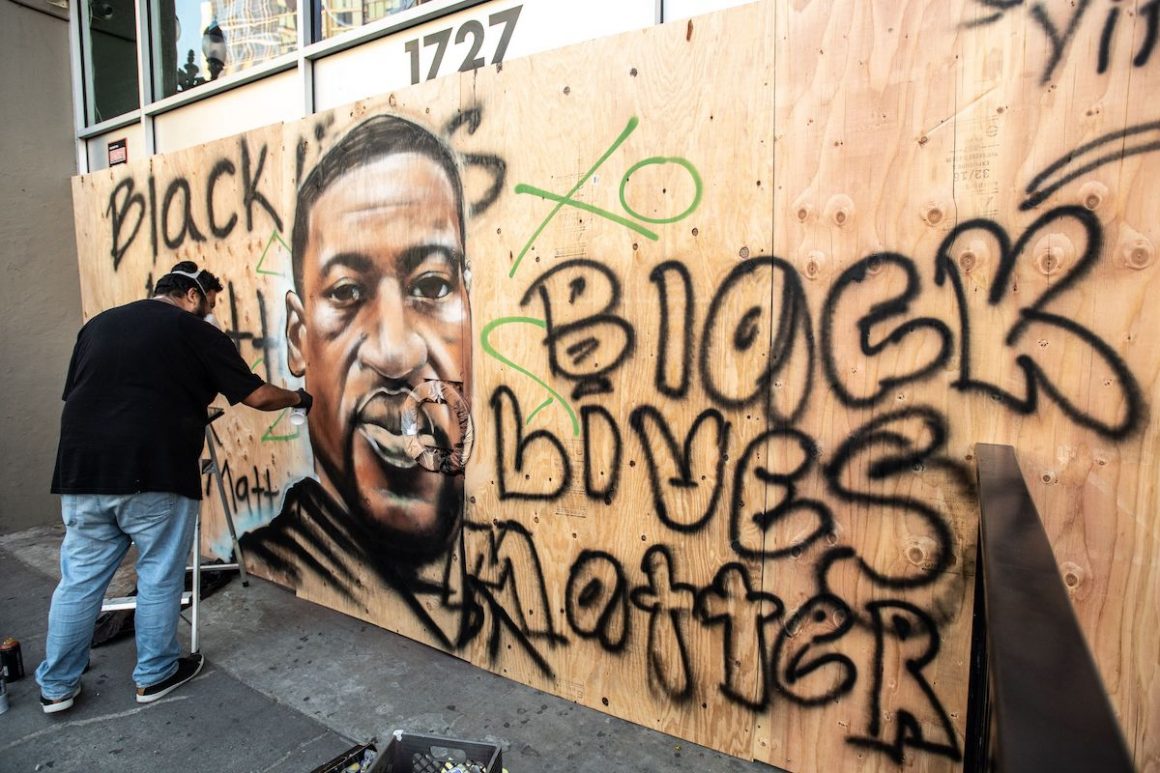by Alex Greenberger | Reprinted from ARTnews
As protests sparked by the killing of George Floyd by policemen in Minneapolis have continued to rock the United States, many in the art world have gotten involved. Earlier this week, artists, curators, and dealers began unveiling initiatives intended to garner financial resources for Black Lives Matter–focused efforts through the sales of artworks and promises to match donations.
On Tuesday, Arts.Black, a publication founded by critics Taylor Renee Aldridge and Jessica Lynne, sent an email newsletter that provided what was described as a “very, very short” list of initiatives to which readers could donate. “It is by no means comprehensive,” Aldridge and Lynne wrote of a list including bail funds for Brooklyn, Hawaii, Pittsburgh, and Seattle, as well as centers and foundations that would accept donations—among them artist Lauren Halsey’s Summaeverythang Community Center in South Los Angeles and the Okra Project, which offers meals and resources to Black trans people.
Around the same time, a few artists said they would use transactions involving their work to help support similar organizations, funds, and initiatives. A group of art workers and designers launched the Art for Philadelphia Community Bail Fund, which allows users to buy $300 works by seven artists based in the city, including Tiona Nekkia McClodden, Alex Da Corte, and Jonathan Lyndon Chase. Proceeds will go to the Philadelphia Community Bail Fund. Among the works available are a photograph by Mark Maddox of protesters destroying a since-removed monument to a former Philadelphia mayor who espoused racist views and a Sharon Hayes print depicting Shirley Chisholm in a magazine spread. Almost all the prints available on the website are already sold out.
Meg Onli, an associate curator at the Institute of Contemporary Art Philadelphia, said that she came up with the idea for the Art for Philadelphia initiative on Sunday after seeing the Maddox photograph, and helped realize it with a group of friends by Monday afternoon. “Larger cultural institutions have failed to respond,” she told ARTnews, referring to what she identified as various museums’ shortcomings, including the lack of people of color in leadership positions and under-acknowledgment of Black artists. “This isn’t a time to wait,” she said. “This is a time to act.”
Paul Mpagi Sepuya, whose work appeared in the 2019 Whitney Biennial, said on Tuesday that he would offer prints of one of his photographs to those who sent receipts for donations of $250, $500, $1,000, and more to a select list of funds. By Wednesday, Sepuya announced on Instagram that he had raised $30,000. He wrote, “30K raised in a day direct to front line foundations for Black lives, queer lives, housing, bail… LOOK AT THAT!!”
Art spaces across the country have been criticized for their response to the George Floyd protests, or the lack of it. Many museums waited until Monday or Tuesday to post statements in support of Black Lives Matter, and were pilloried as a result. And some institutions’ statements proved controversial because they did not directly name the movement, Floyd, or other Black Americans who have been killed, such as Ahmaud Arbery, David McAtee, and Breonna Taylor. The Getty in Los Angeles was among those to issue an apology following a social-media outcry.
By Wednesday afternoon, a few New York galleries had announced initiatives that would see the enterprises matching donations to select organizations. One was Galerie Lelong & Co., which said it would match $5,000 in donations to the Bail Project and the Equal Justice Initiative. Within two hours, the gallery had maxed out its goal and chosen to continue its pledge.
“We are living through history,” Mary Sabbatino, a vice president and partner at Galerie Lelong & Co., said in a statement to ARTnews. “Inspired by the commitment of those marching for justice and the artists of the gallery who have spent their lives examining these issues and mindful of our privilege, we looked for a way to support the movement. I chose two of many organizations doing extraordinary work for the short and long term, with related missions.”
Gladstone Gallery, which has locations in New York and Brussels, said its promise to match donations of $100 to organizations including Black Lives Matter, the Black Visions Collective, and Community United Against Police, had seen so much interest that the gallery decided to up its cap for donations. Initially, the gallery had planned to match $10,000 in donations; within 24 hours, that figure rose to $15,000. Following Gladstone’s lead, one of the gallery’s neighbors, Metro Pictures, also said it would match $100 donations.
“We all need to take action immediately; there is no time to waste,” a Gladstone representative said in a statement to ARTnews. “The ongoing fight against racial injustice requires everyone’s support, so we are using our platform to amplify, strengthen, and contribute to the movement. We all must work every day to challenge the iniquities of the criminal legal system, and strive towards a more just future.”

